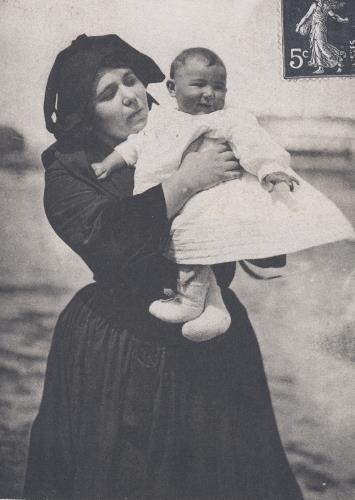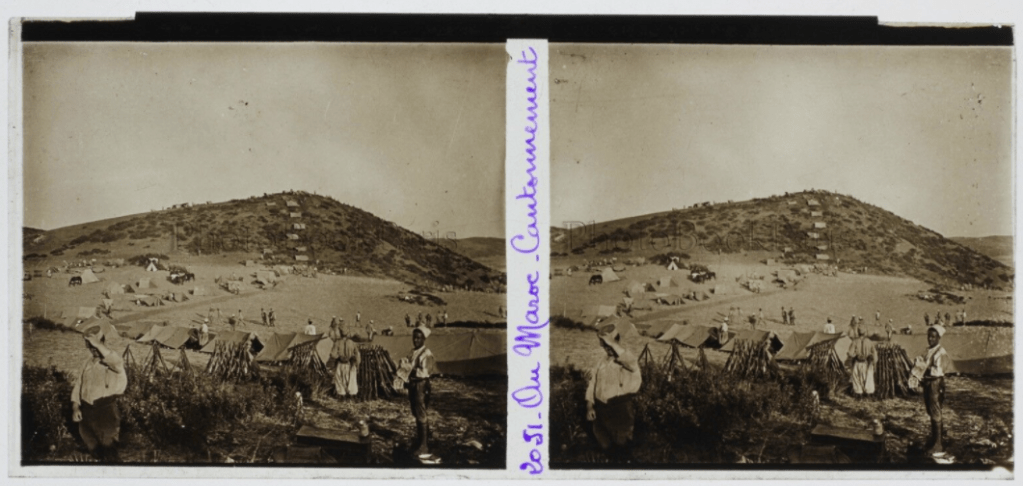< Read other snippets of the mill’s history
An old postcard from the early 1900s shows le Moulin de la Roche with a couple standing outside, presumably the miller and his wife.
The census records available on the departmental archives’ website show that in 1906 the meunier, miller at le Moulin de la Roche was Pierre François Joubert. Pierre Joubert (or François as he seems to have been more usually known) was born 6th July 1868 in Epineu le Chevreuil, a village about 30 km from the mill.
He went to primary school where he learned to read and write and went on to work as a maréchal, a servant employed to look after the horses at Saint Mars d’Outillé, about 70 km east from the mill.
On 11th November 1889, at the age of 21 he was called up to do his military service and joined the 20th Rifle regiment. He completed 3 years of military service and was transferred to the army reserves in November 1892.

On 9th September 1893 he married Rosalie Josephine Huet in St Denis D’Orques, about 20 km from here. He was a young man of 25, 1m60 (5′ 4”) tall with an oval ‘ordinary’ face and auburn hair. Rosalie was 13 years his senior, and from a village called Saint-Ouen-de-Mimbré which is about 60 km to the north-east of the mill – it would be interesting to know how they met. On 6th October 1894 François and Rosalie had a son, Robert. His birth was registered in St Denis D’Orques and his parents were noted as ‘proprietaires‘ in the bourg, village centre of St Denis d’Orques, at time of his birth.

François and Rosalie do not appear on the 1896 census for St Denis d’Orques and his military record shows that he moved to Loué on the 3rd June 1895.
The 1896 census return for St Denis d’Orques however shows Robert Joubert not at his parents’ home but at ‘Le Palis’, the home of Pierre Houard (47) and his wife Françoise Lefort (44) in St Denis d’Orques, together with their 2 children Louise (13) and Marguerite (10). Pierre Houard is shown as a journalier, day labourer. It would appear that Françoise was a nourrice, wet nurse, who was paid to raise Robert.
This was very common practice in France in the 19th century at all levels of society, with your financial means determining the ‘quality‘ of the nourrice. Midwives put new mums in touch with suitable candidates as a matter of course; indeed there were agencies dedicated to this role in all the big towns and cities. Babies were typically weaned at the age of 12 months up to 2 years and only the better off could afford to have a live-in nurse. Robert’s nourrice lived 12 km away from the mill, so he probably didn’t see much of his parents for the first couple of years of his life.

Apart from 2 month-long exercises with the mounted rifle regiment in 1895 and 1898 we don’t know much about what François or his wife were doing in the intervening years.
François and Rosalie moved to Auvers le Hamon, to Moulin de la Roche on the 8th April 1902 and in November 1902 his military record shows he moved from the Reserves into the Territorial army.
Robert is no longer with Pierre Houard and his wife in the 1901 census. (Françoise, who is now 49, now has a new charge; little Georges Chaignard, aged 2). Robert next appears with his Mum and Dad at Moulin de la Roche in the 1906 census.

By 1911 François Joubert has taken on a live-in employee, Félix Jolliveau aged 40, born in Pannecé, 90 km away. His son, Robert, now aged 17, was recorded in the 1911 census as being a miller at the mill.
When the village church tolled its bell to announce that France had joined the Great War on August 3rd 1914, François would have joined all the other men of the commune in the village square, summoned by the beating of a drum, to be handed their orders. As a member of the territorial army, François’ only role in the campaign against Germany was between 5th and 8th August 1914 when he was tasked with requisitioning horses.
So many millers were called up in France and their wives and children left to either cope with the heavy work of running the mill themselves or go bust. Rosalie may not have lost her husband to the army but the couple did not grow old together. Rosalie Joubert was 13 years older than her husband and on 5th September 1915, at the age of 60 she died.
On 29th April 1916 Pierre François Joubert married Victorine Marie Prie. The marriage record mentions his previous wife as Rosalie Huet.
In the meantime, son Robert was not doing so well. His military record shows that he had been exempted from military service in 1914 because he had pulmonary tuberculosis. The record also notes that in May 1917 he received a 6-month prison sentence for the theft of a bicycle and an act of confidence trickery. The case went to appeal and in October the sentence was changed to 8 months but Robert never completed his prison term because he was called up during the general mobilisation of 1918 to join the 2nd Batallion of the Light Infantry of Africa.

This infantry batallion ( also known as Bat’ d’Af’), were French infantry and construction units, serving in North Africa, made up of men with prison records who still had to do their military service or soldiers with serious disciplinary records.

He joined his company in Morocco on 2nd January 1918 but in March that year the review board in Casablanca judged him unfit for active service due to ‘insufficient muscle strength, cardiac hypertrophy and endocarditis’. Robert’s military record also records him being absent without leave in March of that year and having been court-marshalled in Casablanca in August 1918. However, this record has been crossed through, so may have been entered in error.
Robert never returned to le Moulin de la Roche. The final entry in his record reports that he died in the ‘Louis’ Hospital in Meknes, Morocco on the 1st February 1919, aged 24, of bronchopneumonia and flu.
The commune of Auvers lost 45 of its men in the Great War, all of them farmers or involved with agriculture. I don’t know if Félix Jolliveau was still at Moulin de la Roche at this time. He is not shown in the military registry of the department where he was born nor in that of the Sarthe or the Mayenne so presumably had moved elsewhere when he was due for his military service.
Things were obviously not going well for François Joubert towards the end of the war.
He earned a bit of notoriety in 1917 when a court appearance for doctoring his flour appeared in La Gazette de Chateau Gontier. He and four other millers from the surrounding area were charged because their flour did not meet the standard of the sample held by the Préfecture; it was too white. In their defence they said that this was because they only milled local wheat which was naturally whiter in colour than other varieties. Each was fined 16 francs plus costs.

On the 21st May, 1918 he was declared bankrupt by the courts in Le Mans.
It would seem that the Joubert family did not have a particularly happy time at the mill. Le Moulin de la Roche was bought by a certain Pierre Robert and the Robert family worked the mill until the end of the 20th century.
François stayed in Auvers with his second wife Victorine, as the 1921 census shows them living in the centre of the village and records François as being a grain merchant. But by the 1926 census there is no record of them anywhere in Auvers or the surrounding farms. Perhaps they moved away to find work – I don’t know. Maybe one day I’ll chance upon them again.
< Read other snippets of the mill’s history
To read more about how I have been tracing the history of le Moulin de la Roche, select the topic ‘Tracing the history of your French home’ at the bottom of the page.

This was very interesting! Thank you for doing so much research and writing it up for us to read. I like to read about first hand experiences placed in World History.
LikeLiked by 1 person
It’s very personal and entirely selfish research. I find it fascinating to discover more about the people whose home we are now sharing. I’m really happy that you like it too.
LikeLike